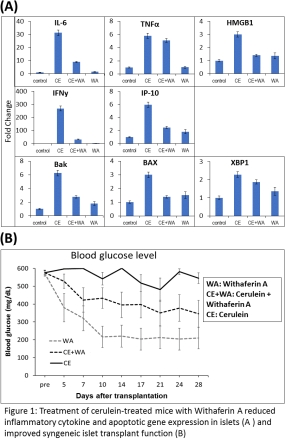NFkB Inhibitor Improves Glycemic Control after Syngeneic Islet Transplantation by Suppression of Proinflammatory and Apoptotic Gene Expression in a Cerulein-Induced Pancreatitis Model
1Fukuoka University, Fukuoka, Japan
2Baylor Scott and White Research Institute, Dallas
3Baylor Simmons Transplant Institute, Dallas.
Meeting: 2018 American Transplant Congress
Abstract number: 15
Keywords: Apoptosis, Inflammation, Islets, Pancreatitis
Session Information
Session Name: Concurrent Session: Islet Cell and Cell Transplantation
Session Type: Concurrent Session
Date: Sunday, June 3, 2018
Session Time: 2:30pm-4:00pm
 Presentation Time: 3:06pm-3:18pm
Presentation Time: 3:06pm-3:18pm
Location: Room 2AB
Total pancreatectomy with islet autotransplantation (TPIAT) is an effective treatment for refractory chronic pancreatitis. Repeated or continuous pancreatitis attack leads islet damage beyond inflamed exocrine tissue. A preventive treatment approach during pancreatitis is important to improve success of islet autotransplantation. NFkB is a major transcriptional factor that regulates proinflammatory cytokine production. We studied the effect of Withaferin A, a plant-derived NFkB inhibitor on the suppression cytokine production in islets using a cerulein-induced pancreatitis mouse model and the outcome of syngeneic transplantation.
Cerulein (CE) was administered intra-peritoneal into C57BL/6J mice by seven hourly injections for one day per week for 4 weeks to establish chronic pancreatitis. In the treatment group, Withaferin A (WA) was administered intraperitoneal in the same day of CE injection. Islets were isolated from pancreas after 1month of CE injection with/without WA, and they were transplanted into STZ-induced diabetic syngeneic mice.
Islets isolated from the CE group showed significant increase in mRNAs of major proinflammatory cytokines / chemokines, IL-6, TNFa, HMGB1, IFNγ, and IP-10 and WA treatment suppressed them. Moreover apoptosis-related genes, Bak, Bax, and XBP1 were upregulated in the islets of the CE-treated mice, while WA reduced their expression. Islets isolated WA-treated pancreatitis mice were more efficient in restoring normoglycemia when compared to CE-treated mice. 
The NFkB inhibitor, WA suppressed cytokine's and apoptotic gene regulations in islets of pancreatitis mice and improved islet autotransplantation function. The results of this study suggest that pretreatment of TPIAT patients with anti-inflammatory drugs may improve transplant outcome.
CITATION INFORMATION: Yoshimatsu G., Darden C., Kumano K., Chang C., Saravanan P., Lawrence M., Naziruddin B. NFkB Inhibitor Improves Glycemic Control after Syngeneic Islet Transplantation by Suppression of Proinflammatory and Apoptotic Gene Expression in a Cerulein-Induced Pancreatitis Model Am J Transplant. 2017;17 (suppl 3).
To cite this abstract in AMA style:
Yoshimatsu G, Darden C, Kumano K, Chang C, Saravanan P, Lawrence M, Naziruddin B. NFkB Inhibitor Improves Glycemic Control after Syngeneic Islet Transplantation by Suppression of Proinflammatory and Apoptotic Gene Expression in a Cerulein-Induced Pancreatitis Model [abstract]. https://atcmeetingabstracts.com/abstract/nfkb-inhibitor-improves-glycemic-control-after-syngeneic-islet-transplantation-by-suppression-of-proinflammatory-and-apoptotic-gene-expression-in-a-cerulein-induced-pancreatitis-model/. Accessed February 25, 2026.« Back to 2018 American Transplant Congress
